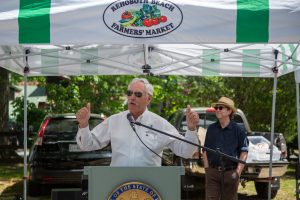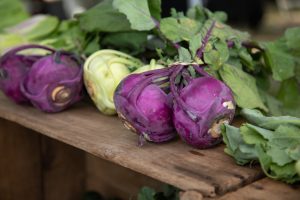 Rehoboth Beach, Del. – Delaware Grown Week – a campaign highlighting the fruits, vegetables, and value-added agricultural products produced in The First State – officially launched with a kick-off event at the Rehoboth Beach Farmers’ Market including Secretary of Agriculture Michael T. Scuse, state legislators, and other officials.
Rehoboth Beach, Del. – Delaware Grown Week – a campaign highlighting the fruits, vegetables, and value-added agricultural products produced in The First State – officially launched with a kick-off event at the Rehoboth Beach Farmers’ Market including Secretary of Agriculture Michael T. Scuse, state legislators, and other officials.
State Rep. Lyndon Yearick, R-Camden-Wyoming, authored the legislation creating Delaware Grown Week in 2015. He said one of the goals of the partnership between the Delaware Department of Agriculture (DDA) and the Delaware General Assembly is to facilitate closer relationships between farmers and local consumers.
“Fresher food translates into better nutrition, better taste, and the potential for creating healthier eating habits,” Rep. Yearick said. “And when consumers spend their food dollars locally, they support Delaware’s family farms and spur our economic activity.” While fresh fruits, vegetables, and herbs are a highlight of farmers’ markets, about half of Delaware farmers’ market sales are typically tied to agricultural products such as meats, cheeses, jellies, breads, salsa, eggs or honey, facilitating small business start-ups.
 “We know consumers – both Delawareans and visitors to our state– are seeking out local food options because they are more and more interested in where their food is produced. Having an array of locally grown, fresh in-season produce encourages consumers to try new fruits and vegetables and eat healthy,” said Delaware Secretary of Agriculture Michael T. Scuse. “With the kickoff of Delaware Grown Week today, I am pleased to announce the release of the new Delaware Grown website. Through the use of an interactive map, DelawareGrown.com helps consumers find local products from fruits, vegetables, herbs and honey to Christmas trees and other value-added products. This is also a resource where citizens can go to learn how to cook using locally grown produce, meet many of our farm families, and learn neat tidbits about the specialty crops we grow here in Delaware.”
“We know consumers – both Delawareans and visitors to our state– are seeking out local food options because they are more and more interested in where their food is produced. Having an array of locally grown, fresh in-season produce encourages consumers to try new fruits and vegetables and eat healthy,” said Delaware Secretary of Agriculture Michael T. Scuse. “With the kickoff of Delaware Grown Week today, I am pleased to announce the release of the new Delaware Grown website. Through the use of an interactive map, DelawareGrown.com helps consumers find local products from fruits, vegetables, herbs and honey to Christmas trees and other value-added products. This is also a resource where citizens can go to learn how to cook using locally grown produce, meet many of our farm families, and learn neat tidbits about the specialty crops we grow here in Delaware.”
Elected leaders and agricultural officials will conduct smaller, targeted activities throughout Delaware Grown Week emphasizing the numerous ways citizens can connect with local farms and enjoy Delaware farm products, such as:
- Shopping at one of the more than 90 onsite farmstands throughout the state.
- Visiting and purchasing locally grown products at one of the 20 community-run farmers’ markets operating in Delaware this year.
- Enjoying time with family and friends at a Delaware “u-pick” operations that offer a satisfying experience for patrons to get the freshest fruit and vegetables possible by harvesting it themselves.
- Participating in a local Community Supported Agriculture (CSA) program, providing shareholders with fresh produce weekly during peak harvest seasons.
Take the opportunity to stop off at a local farmers’ market or on-farm market where there is a variety of fruits and vegetables in season. This is an opportunity to connect with Delaware family farmers that take pride in growing the freshest produce. Many farmers’ markets accept Electronic Benefits Transfer (EBT) transactions, the Women Infant and Children Farmers Market Nutrition Program, and the Seniors Farmers’ Market Nutrition Program – expanding the availability of healthy, fresh fruits and vegetables.
For more information, visit https://delawaregrown.com.
###
Media Contacts:
- Stacey Hofmann, Chief of Community Relations, Delaware Department of Agriculture, 302-698-4542, stacey.hofmann@delaware.gov
- Joe Fulgham, Communications Officer, House of Representatives, 302-744-4184, joseph.fulgham@delaware.gov